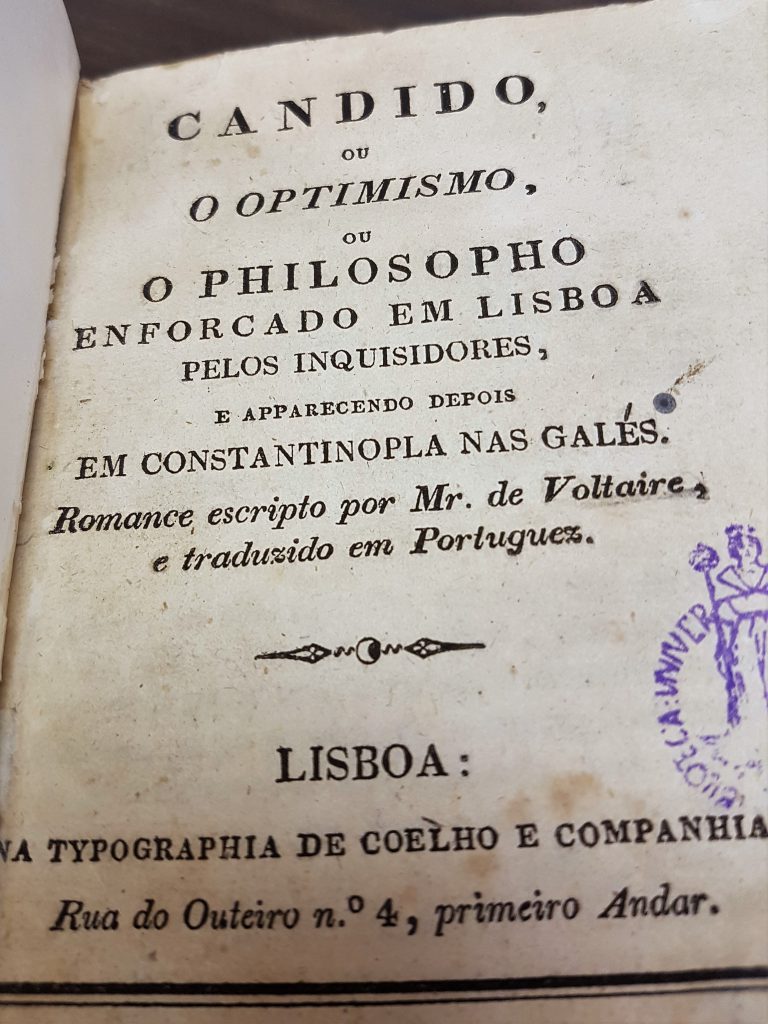Project
The project “Mapping Voltaire in Portugal and in Portuguese Literature” aims at establishing and analysing
the corpus of Portuguese translations of Voltaire’s works – narrative and dramatic fiction, epics, philosophical and political essays -, from the late 18th century to the present day, with an extension to the critical texts associated with that corpus produced in specific historical and cultural periods.
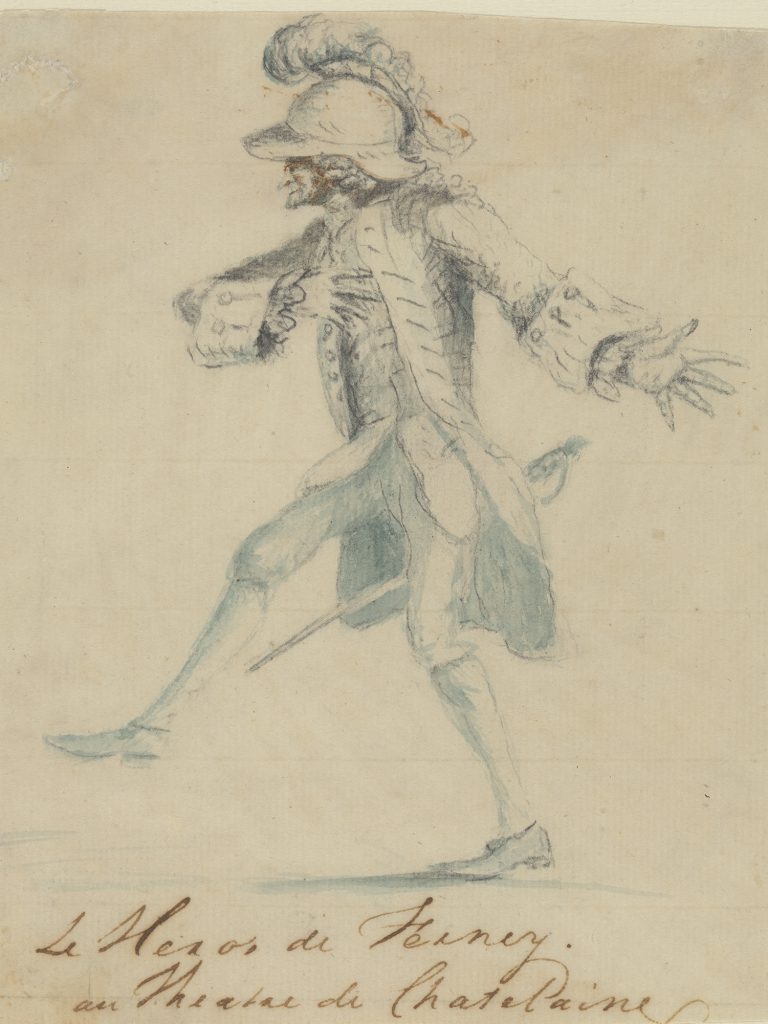
http://institutions.ville-geneve.ch/fr/bge/connaitre-la-bibliotheque/sites/musee-voltaire/histoire
Stages and methods
1ST STAGE
- Identification of the complete corpus of Portuguese translations from the 18th to the 21st century: systematic research, to be carried out in Portuguese and French libraries: comparison of editions; analysis of paratexts; analysis of complementary critical texts (poetics, essays, periodical press).
- Creation of an interactive database, with the corpus of the Portuguese translations of Voltaire, freely accessible, on a website associated with the CLP, establishing a dynamic connection with the catalogues of the Libraries where the corpus is to be found. The database will complement information collected by Gonçalves Rodrigues (Rodrigues, A. G., A tradução em Portugal: tentativa de resenha cronológica das traduções impressas em língua portuguesa, excluindo o Brasil, de 1495 a 1950, (5 Vols.). Lisbon, INCM, 1992-1999), and will develop interaction with the platform “Intercultural Literature in Portugal”. http://www.translatedliteratureportugal.org/
2ND STAGE
- Identification of “case studies”: descriptive analysis of translations, paratexts, critical texts, periodical press.
- Establishment of two types of cartographies:
- 2.1. A literary cartography – aimed at mapping the poetic confluences of Voltaire’s translations with Portuguese literature and culture, considering the topics: a) translation, representation, and the canon (18th and 19th centuries); ii) translation, genre, and poetics (18th century); c) translation and ideological paradigms (20th and 21st centuries)
- 2.2. A political cartography – the aim is to study the relationship between national and translated literature under different types of censorship: a) inquisitorial censorship (18th/19th centuries); b) the censorship of the Estado Novo and the norms of “propaganda”.
- The two cartographies encourage the confrontation with critical essays, texts from the periodical press, paratexts, quotations, illustrations, and collections, (fields of literary theory, history, and sociology).
3RD STAGE
Final editing and publication of the complete work:
- Interactive database;
- Digital anthology with commentaries / “online narrative cartography” (in open access; interlinking with the database and the thematic volume);
- Thematic volume in hybrid format (digital and printed) – Mapping Voltaire in Portugal and in Portuguese Literature – 18th-21st centuries.
4TH STAGE
Dissemination of results:
- International conference;
- Public presentation of the three publications and other dissemination actions in Portuguese and foreign universities;
- Establishment of interuniversity networks for the development of an international project: “European/World cartographies of Voltaire”.
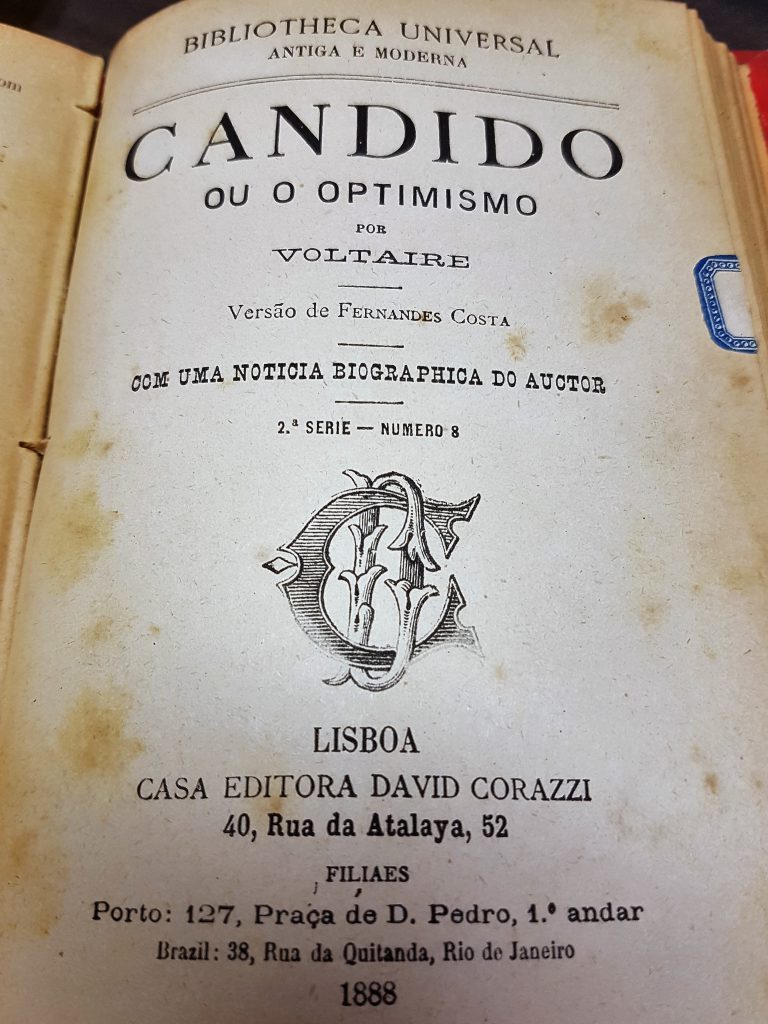
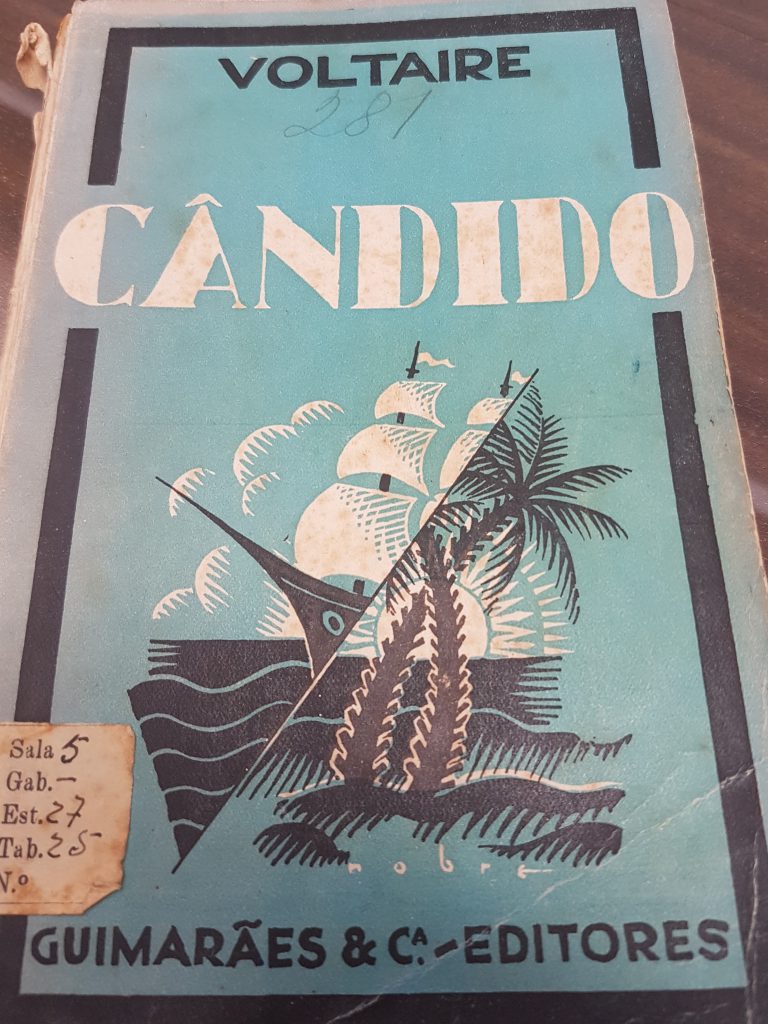
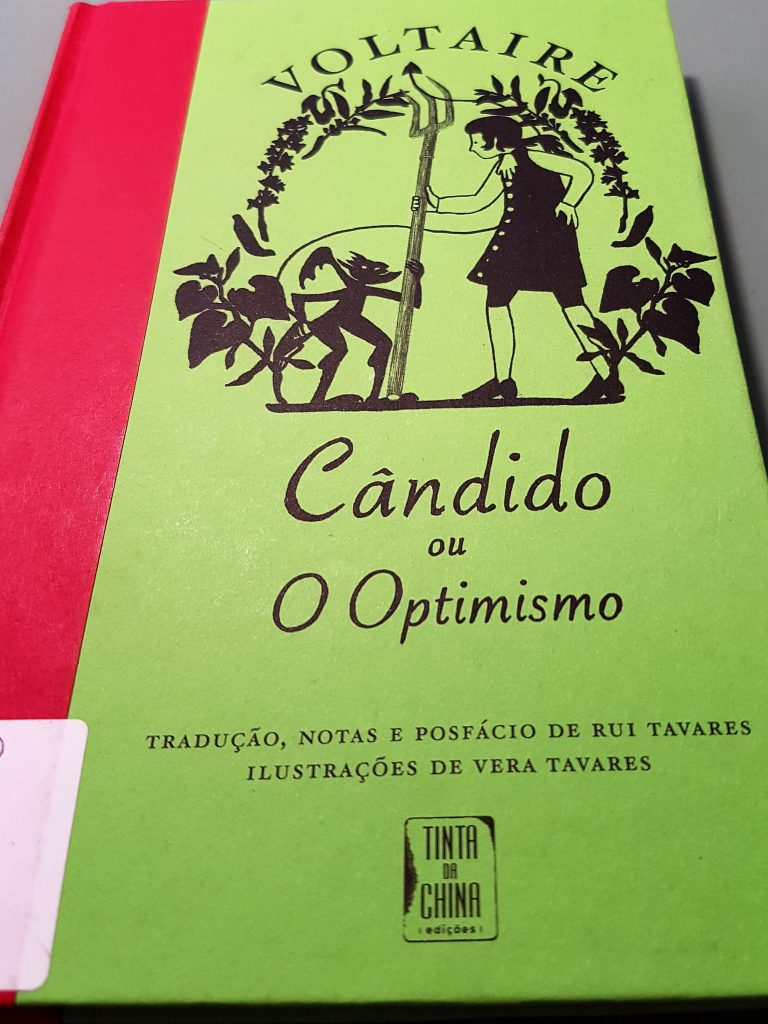
Team
COORDINATOR
Marta Teixeira Anacleto | University of Coimbra
CLP – Centre for Portuguese Literature at the University of Coimbra
ADVISORY BOARD
Laurence Macé | University of Rouen Normandy
CÉRÉdI – Study and Research Centre Editing/Interpreting
Michael Cronin | Trinity College Dublin
1776 Professor of French. Research Lead, Trinity Centre for Literary and Cultural Translation.
https://www.tcd.ie/French/staff/croninm8/
Nicholas Cronk | University of Oxford
Director of the Voltaire Foundation for Enlightenment Studies
https://www.mod-langs.ox.ac.uk/people/nicholas-cronk
Renaud Bret-Vitoz | Sorbonne University
CELLF – Centre for the Study of French Language and Literature
https://cellf.cnrs.fr/membre/renaud-bret-vitoz/
Sylvain Menant | Sorbonne University
https://obvil.sorbonne-universite.fr/obvil/annuaire/sylvain-menant
Stéphanie Géhanne Gavoty | Sorbonne University
CELLF – Centre for the Study of French Language and Literature
https://cellf.cnrs.fr/membre/stephanie-gehanne-gavoty/
MEMBER OF THE PROJECT
Ana Clara Santos | University of Algarve
Arts and Communication Research Centre at the University of Algarve
CLP – Centre for Portuguese Literature at the University of Coimbra
CET – University of Lisbon Centre for Theatre Studies
https://www.cienciavitae.pt/portal/F916-5C9E-5AD6
Ana Cristina Araújo | University of Coimbra
CHSC – Centre for the History of Society and Culture at the University of Coimbra
https://www.cienciavitae.pt/portal/C812-DDC3-C9A3
Ana Isabel Moniz | University of Madeira
CEC – Centre for Comparative Studies at the University of Lisbon
https://www.cienciavitae.pt/portal/951A-82D4-3082
Ana Isabel Vasconcelos | University “Aberta”
CLP – Centre for Portuguese Literature at the University of Coimbra
CET – University of Lisbon Centre for Theatre Studies
https://www.cienciavitae.pt/portal/C11D-5953-63A9
Ana Paula Coutinho Mendes | University of Porto
ILCML – Institute for Comparative Literature Margarida Losa of the Faculty of Letters at the University of Porto
https://www.cienciavitae.pt/portal/2E13-CC7B-FD16
Dominique Faria | University of the Azores
CEC – Centre for Comparative Studies at the University of Lisbon
https://www.cienciavitae.pt/portal/EF14-4262-AA78
Flávio Borda D’Água
Library of Geneva – Voltaire Institute and Museum
João Domingues | University of Coimbra
CLP – Centre for Portuguese Literature at the University of Coimbra
https://www.cienciavitae.pt/portal/9015-9F8C-D95F
Jorge M. C. Almeida e Pinho | University of Coimbra
CETAPS – Centre for English, Translation, and Anglo-Portuguese Studies (NovaFCSH & FLUP)
José Camões | University of Lisbon
CET – University of Lisbon Centre for Theatre Studies
https://www.cienciavitae.pt/portal/1E1A-15F2-6C4C
Licínia Ferreira
CET – University of Lisbon Centre for Theatre Studies
CLP – Centre for Portuguese Literature at the University of Coimbra
Maria da Natividade Pires | Polytechnic Institute of Castelo Branco
IELT – Institute of Literature and Tradition Studies at the New University of Lisbon
CLP – Centre for Portuguese Literature at the University of Coimbra
https://www.cienciavitae.pt/portal/511E-5D94-45E3
Maria do Rosário Neto Mariano | University of Coimbra
CLP – Centre for Portuguese Literature at the University of Coimbra
https://www.cienciavitae.pt/portal/381D-81E8-308C
Maria Helena Santana | University of Coimbra
CLP – Centre for Portuguese Literature at the University of Coimbra
https://www.cienciavitae.pt/portal/9B1E-AE03-9DB3
Maria Luísa Malato Rosa Borralho | University of Porto
ILCML – Institute for Comparative Literature Margarida Losa of the Faculty of Letters at the University of Porto
https://www.cienciavitae.pt/portal/731F-4555-6064
Marie Eulalie Monteiro Pereira | University of Coimbra
Section of French Studies of the Faculty of Arts – University of Coimbra
Marta Rosa | University of Lisbon
CET – University of Lisbon Centre for Theatre Studies
https://www.cienciavitae.pt/portal/9419-5788-0224
Marta Marecos Duarte
CLP – Centre for Portuguese Literature at the University of Coimbra
CLEPUL – Centre for Lusophone and European Literatures and Cultures at the University of Lisbon
https://www.cienciavitae.pt/portal/1C10-01A2-3439
Pablo Iglesias Magalhães | Federal University of Western Bahia / Federal University of Sergipe – Brazil
Humanities Centre
Paulo Silva Pereira | University of Coimbra
CLP – Centre for Portuguese Literature at the University of Coimbra
https://www.cienciavitae.pt/portal/CC19-F84E-FFE9
Rita Bueno Maia | Portuguese Catholic University
CECC – Centre for Communication and Culture Studies at the Portuguese Catholic University
CLP – Centre for Portuguese Literature at the University of Coimbra
https://www.cienciavitae.pt/portal/EF14-4262-AA78
